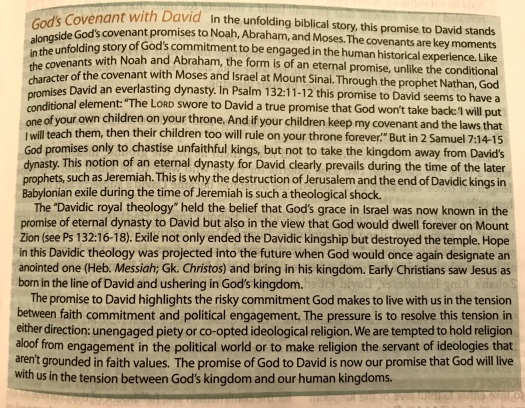2 Samuel 7: The notes in the CEB study bible indicate that verses 1-17 of this book is “the most important theological passage in the books of Samuel. God announces through the prophet Nathan a covenant commitment to the dynasty of David.” The text indicates that David desires to build a temple for God’s chest (the Ark). God talks with the prophet Nathan and tells him to not let David build the temple. Instead his son will do it. I want to also include a picture I took of a little sidebar from the CEB study bible:

The rest of this chapter is a prayer from David to God. The prayer is similar to what we see in many of the Psalms.
2 Samuel 8: This chapter focuses on the many wars David has with several different foes. He wins them all and rules over everyone fairly.
2 Samuel 9: David asks for Jonathan’s son, Saul’s grandson, Mephibosheth. He restores him to a rightful place and honors him because of his father.
Psalm 49: “An instruction on the limits of wealth” (NRSV study bible, p. 813). To me this pretty much says that while wealth may benefit people during their lives, it won’t provide eternal life. Only accepting God will provide that.
Psalm 50: “A covenant renewal liturgy” (NRSV study bible, p. 814). God tells the faithful that he is there for them: “Cry out to me whenever you are in trouble; I will deliver you, then you will honor me” (CEB study bible; Ps 50.15). He then addresses the wicked and sinners, telling them: “The one who offers a sacrifice of thanksgiving is the one who honors me. And it is to the one who charts the correct path that I will show divine salvation” (CEB study bible; Ps 50.23).
Psalm 51: I like this explanation from the notes section:
“Prayer of repentance and renewal. An individual petition, one of the most profound of the seven penitential psalms in Christian tradition (Pss 6; 32; 38; 51; 102; 130; 143). It is attributed to David a er the prophet Nathan confronted him over his adultery with Bathsheba and the murder of Uriah (2 Sam 12), a reminder that all humans, even the most revered, must ask God for forgiveness.” (NRSV Study Bible, p. 815).
I don’t really have a lot to add. The message here is that it’s important to ask for forgiveness.
